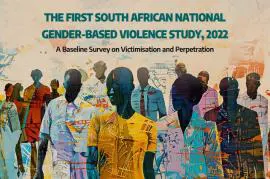Hurt men, hurt women: groundbreaking study reveals patterns of gender-based violence
Sara-Jayne Makwala King
19 November 2024 | 11:05A country-wide study (South African National Gender-Based Violence Study) has revealed the prevalence of gender-based violence (GBV) in all nine provinces.
Gender activist Advocate Brenda Madumise-Pajibo (Wise4Afrika) joins Bongani Bingwa.
Listen below.
Do men who witnessed domestic violence as children grow up to become perpetrators of gender-based violence (GBV) themselves?
The answer to the question can be found, in part, in the results of a first-of-its-kind study titled the 'South African National Gender-Based Violence Prevalence Study'.
It reveals alarming statistics on the prevalence of physical, sexual, emotional, and economic violence, as well as psychological abuse.
Over 35% of women reported experiencing physical violence.
An estimated 2.1 million women experienced sexual violence.
The first-of-its-kind study paints a bleak picture.
"It gives us a national baseline of what we have been talking about for the last 15, 20 to 25 years... It's sobering. It requires that all of us interact with it and understand what it tells us."
- Brenda Madumise - Gender activist, Wise4Afrika
The study also examined the underlying role of gender norms in driving GBV and provides new evidence and confirmation of the patterns of violence against women in South Africa.
"Now... we've got facts..."
- Brenda Madumise - Gender activist, Wise4Afrika

The study provides an understanding of the 'who', 'how' and 'why' of victimisation and perpetration in South Africa.
"When you're exposed to that as a child... you think it's normal, you think it's correct... you think it's how life should be..."
- Brenda Madumise - Gender activist, Wise4Afrika
Twenty percent of the men surveyed admitted having been perpetrators of violence in their lives.
"And when you become that, we shouldn't be surprised, because that's what you've witnessed in your formative years."
- Brenda Madumise - Gender activist, Wise4Afrika
ALSO READ: GBV at universities ‘rooted in socialisation, entitlement and toxic masculinity’
Scroll up to the audio player to listen to the interview.
Get the whole picture 💡
Take a look at the topic timeline for all related articles.
Trending News
More in Local

16 October 2025 06:00
CPUT management says no approved plans to adjust student fees

16 October 2025 05:48
Systems & controls in place to prevent another Tembisa Hospital scandal - Gauteng health dept

16 October 2025 05:39
Schools must monitor their staff closely, says parent whose son was allegedly molested by former teacher at St John's Prep School













